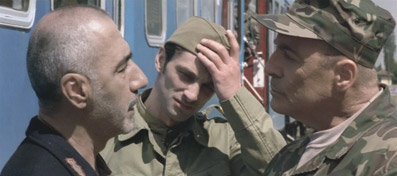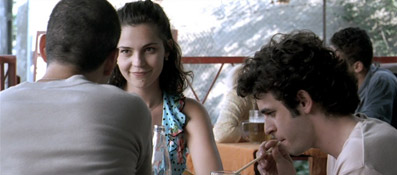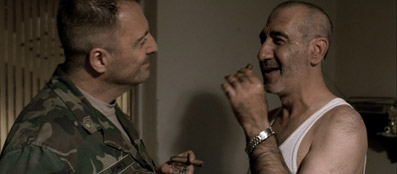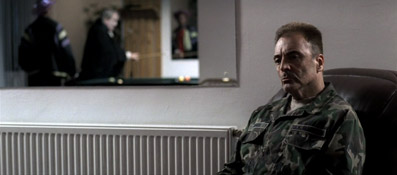|
Here's a poser for you. Is it more tragic when a great director dies at the peak of his career or when a talented newcomer is taken at the very start of his? Putting aside the fact that a fair few filmmakers have made a serious splash with their first film and then royally screwed up on the subsequent work, I'd have to go with the latter. To lose an established master when you just know he or she had more great films in them is painful, but to see a talent of considerable promise cut down before they even get to prove that their first film – the one that that puts their name on the lips of festival organisers and enthusiastic cineastes everywhere – was anything but beginner's luck, well that really hurts.
You may well know the story behind California Dreamin', the latest trophy in the seemingly unstoppable rise of new Romanian cinema, but for those who don't I'll quickly summarise. It's the first feature directed by the 27-year-old Cristian Nemescu, a graduate of Bucharest's Academy for Theatre and Film. On 24th August 2006, when the film was in the final stages of post-production, Nemescu and his sound engineer, Andrei Toncu, were in a taxi that was struck by a Porsche (driven by a British citizen, in a grim reflection of the film's interventionist subtext) that had run a red light and was travelling at 113 km/h, almost twice the speed limit and close to three times that of the taxi. Both Nemescu and Toncu were killed. Out of respect for Nemescu's work, the producers took the unusual step of releasing the film in the form it had reached at the time of Nemescu's death. This effectively excluded it from consideration for the Un Certain Regard award at Cannes, whose rules stipulate that only completed works can be entered in competition. But after seeing the film the jury decided to make an exception, and the film emerged as the winner, jury president Pascale Ferran calling it "far and above, the most lively and liberated film proposal we've seen in our ten days here."

What any audience apprehensive about this should take on board is that the editing was very close to completion, close enough for most with no knowledge of these events to assume they were watching a finished work. It may well be that some re-editing or trimming of scenes would subsequently have taken place, but there are no gaping holes where events are explained by captions, or sound glitches awaiting re-recording or the adding of music. Exactly what final changes Nemescu still had to make remain the subject for conjecture – the official line is that he was just 2 days from completing the edit – and are part of the reason the producers chose to leave well alone. For all intents and purposes this is a complete film and should be viewed that way, not as a compromise version. This unfinished status is what earns the film its bracketed sub-title, (Nesfarsit) or (Endless).
And so to the film itself. Now even if you were unaware of it going in, it would be a slow viewer who didn't realise that California Dreamin' had a strong allegorical element. After all, any drama involving NATO soldiers, uncooperative locals, obstructive bureaucracy and communication issues offers itself up for a number of readings – just pick a modern conflict and country and you're off. The story here is set in Romania in 1999 and the NATO officer in question is American Captain Doug Jones (Armand Assante), who's been charged with the task of transporting a cargo of radar equipment by rail to the Yugoslav border to support the war effort. It's all going smoothly until the train reaches the small town of Capalnita, whose station master Doairu (Razvan Vasilescu) has built himself a position of corrupt power within the community by helping himself to a portion of the cargo being carriued by any train passing through his station, and protects himself from prosecution by cutting the local police chief in on the deal. In what initially seems like an act of petty-mindedness on his part, he refuses to allow the NATO train to pass because Jones does not have the necessary customs documents and he is unimpressed by the major's assurance that they have government clearance. "Fuck USA," Doairu tells Jones to his face, "fuck NATO and fuck Bill Clinton!" But this is more than a petty bureaucrat on a power trip. Intermittently the film flashes back to a monochrome WW2 story of falling bombs, invading Nazis and a child left by parents who assure him that the Americans will soon arrive. And now they are here, but over fifty years too late for the man this boy has grown up to be. Care to guess who that is?
For the rest of the town's occupants, the stranding of the American soldiers is a major event, depositing exotic visitors on their doorstep for them to entertain, flirt with and protest their grievances to. The local mayor (Ion Sapdaru, who's become something of a regular in prestige Romanian films of late) switches the date of the town's anniversary celebration to throw a party for the soldiers; Doiaru's keen-to-leave daughter Monica (Maria Dinulescu) strikes up a romance with handsome young sergeant David McLaren (Jamie Elman) in the hope this will offer her a way out of this dead-end town; local schoolchildren get quick but hopelessly generalised lessons on America and its culture; and news of the train's approach prompts workers at a local factory to down tools and set up a protest on the tracks at a point that the train is subsequently prevented from reaching.

It doesn't take long for tensions to build, as Jones becomes increasingly exasperated by the obstinacy of the station master, whose antagonism towards the Americans is further fuelled by his daughter's involvement with McLaren and her determination to leave home. The mayor unknowingly throws petrol on the flames with his enthusiastic, well intentioned but clumsy attempts to entertain the troops with everything from a local Elvis impersonator and cowboy-dressed girls to a theatrical hilarity entitled 'The Mystery of Dracula', which unleashes a group of local sexpots on his guests, pushing the simmering Jones a few notches closer to boiling point. Previous potential conflict flashpoints have been sidestepped by common sense, sometimes in the face of narrative expectations – a punch thrown at one of the soldiers by a jealous local boy at the celebration dance is prevented from developing into the traditional free-for-all, while Jones' early preference for a confrontational approach is shelved on the advice of the more diplomatically minded McLaren.
Communication failure and its consequences become both the central narrative issue and the film's allegorical meat. The language barrier in particular proves an issue that the subtitling makes us privy to in a way that the characters are obviously not. This develops on two fronts, with Jones' frustration at not being able to clearly voice the urgency of his mission to the Mayor mirrored by the inability of Monica and David to articulate their developing feelings for each other. Both parties are required to talk through interpreters, but while the information available to both is initially narrowed by the proximity or otherwise of a willing translator, a key conversation between David and Monica is wilfully misrepresented by Andrei, a dorky fellow student whom Monica has asked for help who is secretly in love with her and thus jealous of her feelings for this good-looking outsider. On occasion the lack of understanding proves an unexpected blessing – as Jones sits fuming in a side room away from the Dracula fiasco, his inability to understand the insults that are being thrown at him by two of the locals is all that prevents the scene from erupting into violence.
This communication barrier extends to the cultural differences, in the expectations of the local girls and the behaviour of at least one of the soldiers, in the Mayor's shallow understanding of American culture, and even in Jones' reading of Doiaru's motives. His attempt to quietly bribe a man for whom corruption is part of his make-up is thrown back in his face, but Doiaru's professed contempt for the Captain's derogatory view of his country, though perfectly valid, is only half the story. Crucially, and a little ironically, Jones and Doiaru only really communicate when they temporarily put their official positions on hold and meet one-to-one over a drink, a cigar, or a home-cooked dinner at Doiaru's house. The frustrations and prejudices are still there, but just for a short while we are shown a way forward for both parties, and teased with the prospect that this all might end well after all.

World cinema has thrown up a good many allegorical tales in recent years on the effects American interventionism, but few are as smart, as entertaining or as confidently handled as California Dreamin'. Crucial to what makes it work so well is the casting and direction of the non-Romanian parts. Whereas American or even English characters in Eastern European films are sometimes weakly written or caricatured, and too often played by any English-speaking actor the production could lay its hands on, here the two key American roles have been cast as carefully as their Romanian counterparts and are written and played with the sort of intelligent subtlety that suggests Nemescu was both a fluent English speaker and a student of western acting styles and dialogue delivery. Armand Assante in particular hits just the right note as Captain Jones, his bull-neck exasperation kept constantly in check but always visible bubbling just under the surface. Unlike their equivalents in a good many other movies, both Jones and McLaren are fully rounded, believable and likeable – indeed, for a good part of the film I found myself fully sympathising with Jones's building frustration. In this respect, Nemescu wisely concentrates not on the background politics of his mission but on the human element, on the experience of a man just trying to do his job but at the same time unable, as so often happens, to adapt to a different way of thinking and doing things. He's matched all the way, both in performance and character depth, by Razvan Vasilescu's stubbornly obstructive Doiaru, and the scenes in which the two meet alone and talk as men rather than officials are some of the most telling and enjoyable in the film.
The naturalism of the performances is matched by Catalin Cristutiu's observational camera style, which despite a few smooth dolly shots and a couple of crane moves is largely hand-held, but thankfully free of that artificial wobble of so many post-Dogme dramas. Intermittently, this results in an almost documentary realism, particularly when background characters are observed going about their business (the preparation for the anniversary celebration is a good example), no mean feat given that the film was shot in the decidedly non-documentary scope ratio.
If the subtlety of the early chapters slips a bit towards the end, when the allegorical message is driven home with a larger hammer, it still retains its relevance and potency, particularly in the final misreading of a firework display by those with no knowledge of the events that triggered it or awareness of their role in its causation. To reveal more would act as a major spoiler and the discussions on the full and intended massage of those final scenes should take place only between those who have seen it, which you should make every effort to do if you have not done so already. For a first feature by a young director, California Dreamin' is remarkable in its confidence, its maturity, its performances, its easy naturalism, and the unforced clarity of its message. Providing as it does further evidence of the strength of the New Romanian Cinema, its legacy is ultimately a sad one, the first major work of a talent whose life and career were lost before either had a chance to really get going.
Anamorphic 2.35:1, the picture is close to pristine in the crispness of its detail, the only real variable being the contrast and brightness – the image is a on the bright side with sometimes greyed-out black levels in the first half, but just over an hour in both elements suddenly correct themselves. If you're monitor's properly callibrated you should be able to get an idea of the difference by comparing the first two frame grabs above. I may be cutting Artificial Eye undue slack here, but I'm assuming this is due to the final print grading not being carried out by Nemescu before his death.

Whether the sound mix was completed is uncertain – certainly frontal separation is better on the stereo track, but there are some very specific uses of the rear speakers on the 5.1. Dialogue is always clear and the sound effects and music appear to all be in place and sound fine.
Trailer (2:53)
A brisk, smartly edited and seductive promo for the film.
The Making of California Dreamin' (31:47)
Shot during the film's production, this busy featurette plays like an extended EPK, but a sincere and interesting one that's impossible to watch without a sense of sadness for the events that followed, particularly when listening to actors praising director Nemescu, or the man himself talking about his hopes for future projects. It's a mixture of interviews and on-set footage that covers a lot of ground, from the project's inception to the hopes for the success of the completed film. Nemescu outlines the project and the casting choices, while the actors discuss their characters, the film itself, their fellow performers (the Romanians were impressed with Assante, and he has nothing but praise for Razvan Vasilescu) and for Nemescu's skill as a director and quiet modesty. In a particularly interesting sequence that recalls the real-life incident that inspired the film, a costumed Armand Assante questions the actual station agent Florin Pătrăchioiu, with translation provided by Romanian actor Andi Vasluianu, who plays Jones' translator in the film.
The first and only feature of a new talent whose career was cut tragically short, California Dreamin' provides further proof, if any were needed, that new Romanian cinema is looking to rule the world cinema roost. A confident, compelling and most impressively performed study of the dangers of communication failure, it's message is international and deserves to find a wider audience than its 'foreign film' tag will probably land it. It's well served on Artificial Eye's DVD, which despite having only one substantial extra comes recommended.
|